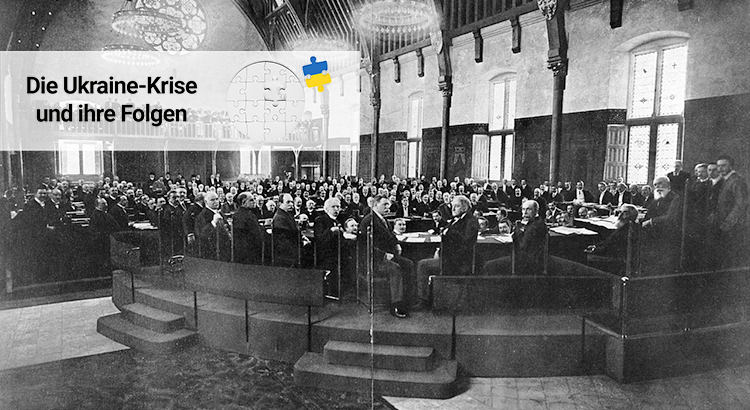The Ukrainian government has requested other states to provide military material, which Germany and other states have acted on. Russia asserts that states making such deliveries are involving themselves in the conflict and would regard such deliveries as military targets and treat them accordingly. Targeting vessels carrying such deliveries is using force against the state sending these materials, which is not allowed unless a state becomes a party to the conflict. Consequently, it is important to determine when a state is no longer neutral and what the difference is between not being neutral and becoming a party to the conflict.
The Concept of Neutrality
Traditionally this has been a situation governed by the law on neutrality, but the larger international legal framework has changed since the development of this concept, leading to the question of whether these decisions need to still be considered from the perspective of neutrality or if a more active approach is permissible without becoming subject to the use of force.
Neutrality is a concept within international law that seeks to protect states not party to a conflict from being involved. Much of the law of neutrality can be found in two of the 1907 Hague Conventions, Convention (V) respecting the Rights and Duties of Neutral Powers and Persons in Case of War on Land and Convention (XIII) concerning the Rights and Duties of Neutral Powers in Naval War. Many of the provisions in this treaty have become customary international law. The concept finds its basis in the 18th and 19th century where states were more free in deciding to use force against other states. Consequently, it was found that there was the need to ensure that states not directly involved in an armed conflict were protected from the consequences of said armed conflict.
This led to the development of the law on neutrality, incorporating specific rights for a neutral state to ensure such protection. These include that such states are not to be attacked, their territory is inviolable and merchant vessels from neutral parties cannot be targeted. While the protection from the use of force against a neutral state is not the sole outcome of the law of neutrality, it has often been considered as the most important one. Outside of this, the law on neutrality allowed for the continuation of normal relations between neutral states and one or both parties to a conflict.
In exchange for these protections neutral states have been prohibited from acting within the armed conflict, recruit troops for the belligerents, provide military intelligence or supply military equipment. It is currently especially the latter that several western states appear to be breaching or intending to breach. The prohibition of neutral states to supply military equipment is a long-standing aspect of the law on neutrality and can be found in art. 6 The Hague Convention (XIII) concerning the Rights and Duties of Neutral Powers in Naval War, 18 October 1907. While this treaty is focused on the issue of naval war, this provision has been accepted as a generally applicable rule of customary international law and is vital to the concept of neutrality, as it would violate the principle of non-participation. Therefore, the delivery of arms is a clear violation of the law of neutrality.
The Prohibition of the Use of Force and Neutrality
However, much has changed in the field of international law since the development of neutrality law. Perhaps most important in this regard is the prohibition of the use of force. The concept of neutrality was developed specifically to protect neutral states from becoming involved within an armed conflict and being subject to uses of force. States fulfilled their obligations under neutrality law to ensure the protection of the right of the inviolability of the territory of neutral states. This was not always successful and often relied on the belligerent states to accept the neutral status. The question that needs to be asked is in what manner this is still a relevant concept in the current international legal framework.
Art. 2(4) UN Charter prohibits the use of force with only self-defence and UN Security Council authorization as universally accepted exceptions. Other exceptions have been discussed, however even these are limited. This has since clearly become customary international law that is binding on all states. Therefore, breaches of neutrality law that do not amount to actual use of force can no longer lead to a state becoming a party to a conflict against which the use of force is allowed.
There are those (such as for example Prof. Stefan Talmon) that have argued that the prohibition of use of force has led to the situation that the law of neutrality is not of relevance in the context of a war of aggression. That because the aggressor acts in a manner which is contrary to international law they cannot rely on any rights stemming from the existence of a state of armed conflict. This however is a dangerous line of argumentation, as this could have significant effects on other aspects of the law relating to armed conflict, such as notably humanitarian law, where the equal treatment of all parties to the conflict, regardless of the start of the armed conflict, is a foundational aspect.
It has been brought up that within the law of neutrality the supplying of such material is a breach of the obligation of neutrality and could be considered as an internationally wrongful act. Accordingly, it would be possible for Russia to enact countermeasures against this state. However, art. 21 of the Draft Articles on State Responsibility could preclude such countermeasures in the present case as these breaches of neutrality could be considered as part of collective self-defence (see for example Prof. Kai Ambos). This is the case because, due to the prohibition of the use of force, it is not considered unlawful to support the victim in the case of aggression, which could be referred to as qualified neutrality. It would still constitute a breach of the law on neutrality, except that the wrongfulness would be precluded. Consequently, the nature of the law of neutrality would seem to not be directly concerned with this concept and not be directly related to the notion of countermeasures.
This is especially the case because the most important possible response would not be based on the concept of internationally wrongful acts, but rather on the legal rules concerning contraband. During an armed conflict a party to the conflict has the authority to conduct searches of incoming trade and vessels to ensure that military material is not supplied to the opposing party. Consequently, Russia would still be within its right to attempt to prevent the supplying of weapons and other military material to Ukraine, through search and seizure. This could potentially be accompanied with force if the vessel carrying the material does not comply with its search and potential seizure. Again, this would not directly involve the law of neutrality.
Conclusion
The law of neutrality has been a long-standing and important aspect of the international law relating to armed conflicts, however it is debatable whether the relevance of the law on neutrality still has the same weight and importance that it once had. The prohibition of the use of force no longer necessitates the supplemental protection of neutrality law against potential uses of force from one of the parties to a conflict and this increases the avenues for states to act beyond the boundaries of the traditionally rules on neutrality.
Much of the traditional importance of the law of neutrality has thereby been hollowed out. In this respect, it can be questioned whether a stringent application of the law of neutrality is of such great importance. Therefore, in cases of flagrant violations of the UN Charter and the prohibition of the use of force a more proactive and less impartial approach is warranted, insofar as the traditional reason for neutrality, namely the preclusion of being party to a conflict and subject to potential use of force, is no longer there. The notion of neutrality in this manner acts as a holdover of an earlier time and it is time for a more realpolitik approach to the issue.


